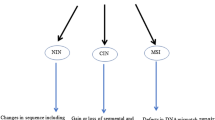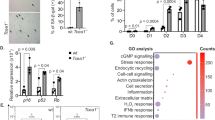Abstract
Viral transformation of mouse and human fibroblasts has very different effects on the composition of cyclin-dependent kinase (Cdk) complexes. In human cells transformed by the large T-antigen of simian virus 40 (SV40 T-Ag) and human tumour cell lines that lack a functional retinoblastoma gene product (pRb) no cyclin D1-Cdk4 complexes can be detected because all the available Cdk4 is associated with the Cdk-inhibitor p16INK4a. In contrast, SV40-transformed mouse cells and fibroblasts from Rb1-nullizygous mouse embryos contain normal levels of cyclin D1-Cdk4 complexes. To investigate this species difference, we have compared the biochemical properties and expression of mouse p16INK4a with that of its human counterpart. There is a marked increase in p16 RNA and protein levels as primary embryo fibroblasts approach their finite lifespan in culture, but mouse p16 expression does not appear to be influenced by the status of pRb. Transformed or spontaneously immortalized mouse cells therefore do not achieve the very high levels of p16 characteristic of pRb-negative human cell lines. We suggest that these differences may be related to the different frequencies with which mouse and human cells can be immortalized in culture.
Similar content being viewed by others
Author information
Authors and Affiliations
Rights and permissions
About this article
Cite this article
Palmero, I., McConnell, B., Parry, D. et al. Accumulation of p16INK4a in mouse fibroblasts as a function of replicative senescence and not of retinoblastoma gene status. Oncogene 15, 495–503 (1997). https://doi.org/10.1038/sj.onc.1201212
Received:
Revised:
Accepted:
Issue Date:
DOI: https://doi.org/10.1038/sj.onc.1201212
- Springer Nature Limited
Keywords
This article is cited by
-
How do K-RAS-activated cells evade cellular defense mechanisms?
Oncogene (2016)
-
Alterations in transcriptional responses associated with vascular aging
Journal of Inflammation (2009)
-
Genetic cooperation between p21Cip1 and INK4 inhibitors in cellular senescence and tumor suppression
Oncogene (2007)
-
Regulation of the INK4b–ARF–INK4a tumour suppressor locus: all for one or one for all
Nature Reviews Molecular Cell Biology (2006)
-
Cdk6–cyclin D3 activity in murine ES cells is resistant to inhibition by p16INK4a
Oncogene (2004)




